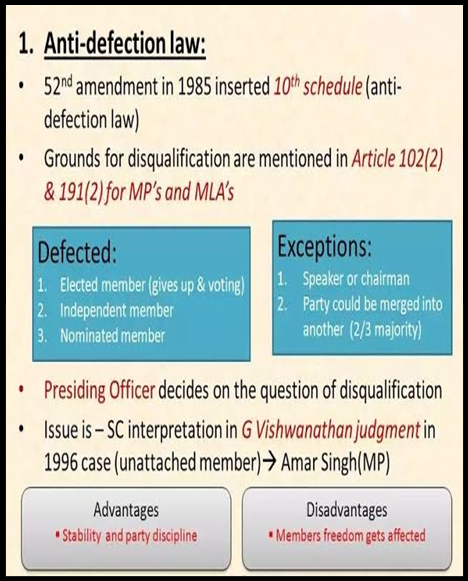A SPEAKER’S CONTROVERSIAL DECISION:
(AN IN-DEPTH ANALYSIS)
Syllabus:
GS 2 : Indian Constitution- Features, Amendments, and Significant Provisions.
Focus :
Determining Defection
Why in the News?
- Maharashtra Assembly Speaker, Rahul Narwekar, faced a crucial decision.
- Tasked with determining if Shiv Sena MLAs, under Eknath Shinde’s leadership, defected by voting against the party whip.
Source : UGI
About the Case :
- Petition Origin: Filed by the original Shiv Sena party seeking disqualification of the breakaway group led by Eknath Shinde.
- Speaker’s Jurisdiction: Triggered by the petition, Speaker Narwekar tasked with determining if Shinde group’s actions constituted defection.
- Rebel MLAs’ Actions:
- Secret meetings in a distant state.
- Non-participation in crucial party meetings led by Uddhav Thackeray.
- Formation of an alliance with the Opposition.
- Flaws in Speaker’s Judgment:
- Misinterpretation of Tenth Schedule: Initially provided options to avoid disqualification, split provision omitted in 2003.
- Incorrectly determining faction legitimacy: Speaker’s role confined to identifying defected party, not deciding real party.
- Incorrectly determining the legitimacy of the faction, a role designated for the Election Commission.
- Judicial Clarity:
- Recent Subhash Desai vs Principal Secretary case: Supreme Court clarifies the irrelevance of party split.
- Narwekar erroneously tries to ascertain the real party, a task designated for the Election Commission under paragraph 15 of the symbols order.
- The Supreme Court’s clear enunciation of law contradicts the Speaker’s jurisdiction.
- Speaker’s declaration validating Chief Whip and legislature party leader appointments defies SC’s ruling.
About The Anti – Defection law:
Anti-Defection Law:
- Penalizes MPs/MLAs for leaving one party for another.
- Added to the Constitution in 1985 as the Tenth Schedule.
- A response to prevent instability caused by party-hopping legislators.
Provisions and Changes:
- Known as the Anti-Defection Act, it allows disqualification for defection.
- Originally allowed a ‘split,’ changed by the 91st Constitutional Amendment in 2003.
- Two-thirds majority required for a ‘merger’ to be valid.
- Members disqualified can still stand for elections from any party for the same House.
Defection Grounds:
- Voluntary Give Up: If a member voluntarily leaves the party.
- Violation of Whip: Voting against party directions without permission or defying party whip constitutes defection.
- Elected/Nominated Member: Joining another party after a certain period.
Criteria for Voluntary Defection:
- Each case requires evaluating facts and circumstances.
- Supreme Court precedent (Rajendra Singh Rana vs Swami Prasad Maurya) emphasized Opposition collaboration as a sign of voluntary defection.
Source: OneIndia
Impact of Defection on Political System:
- Subversion of Mandates: Legislators shifting parties after elections.
- Affects Government Functioning: Leads to instability and hampers administration.
- Promotes Horse Trading: Promotes Horse Trading of legislators which goes against democratic principles.
Challenges with Anti-Defection Law:
- Ambiguity in Paragraph 4: Lack of clarity on the national/regional basis for party merger.
- Controversial Role of Speaker: No clear timeframe for anti-defection cases.
- Recognition of ‘Merger,’ Not ‘Split’: The law only recognizes a merger, not a split.
- Wholesale Defection Allowed: Amendments needed to prevent loopholes and promote accountability.
- Impact on Debate and Discussion: Favours a democracy of numbers over meaningful discussions, blurring the line between dissent and defection.
- Legislators follow party directions blindly, affecting accountability.
Impact of Flawed Decision:
- Speaker Narwekar’s decision, attempting to avert disqualification, lacks jurisdictional basis and contradicts established legal principles.
- The flawed judgment raises concerns about the misinterpretation of the anti-defection law and the Speaker’s role in determining faction authenticity.
Way Forward:
- The case underscores the need for legal clarity in interpreting and applying the anti-defection law.
- Parliament’s intent in omitting the split provision should be upheld, emphasizing the Election Commission’s authority in deciding the real party.
- Upholding the integrity of constitutional provisions is crucial to maintaining the sanctity of anti-defection laws.
- Ensure strict adherence to constitutional provisions in future defection cases.
- Avoid attempts to determine the real party outside the Election Commission’s jurisdiction.
- Consider legal reforms to address ambiguities and maintain consistent application of anti-defection laws.
Maharashtra Assembly Speaker’s flawed judgement showcased legal misinterpretations. The Tenth Schedule’s clear provisions, SC’s precedents, and the role demarcations of authorities need careful adherence. The dispute highlights the significance of a fair and legally precise approach in handling defection cases.
Mains Practice Question:
Evaluate the evolution of the anti-defection law in India. Discuss the strengths and weaknesses of the current framework, highlighting ambiguities and loopholes that can be exploited.

 Source : UGI
Source : UGI

